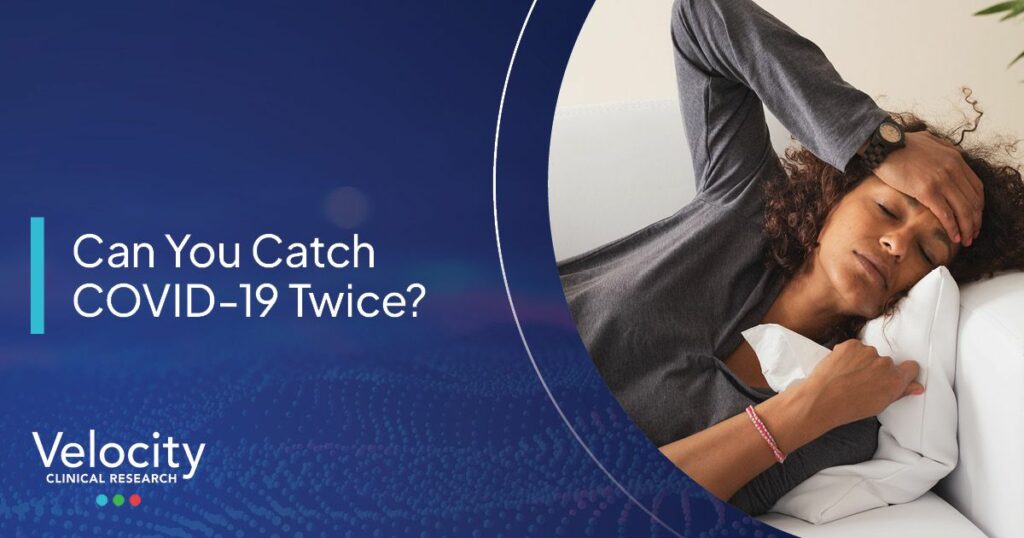I Already Had the Coronavirus; Can I Get COVID-19 Again?
Due to the high prevalence of the Delta Variant of COVID-19 and the many unanswered questions surrounding the novel coronavirus, many are worried about becoming infected. For those who have received a COVID-19 vaccine, been sick with the virus already, or both, the worry might not be as strong due to the antibodies present in their bodies. But the question nevertheless is there: Can you get COVID-19 twice? The short answer is yes, but the longer answer takes some explanation.
How COVID-19 Infections Happen
It’s common knowledge that viruses can spread through droplets and aerosols, surfaces, and the air. But once we come into contact with the virus, how it causes an infection is less easy to know.
In the case of COVID-19, infection generally starts by inhaling an infected person’s droplets while interacting with or being near that person. Once you inhale the droplets, the virus finds some healthy cells in your respiratory tract to take over. It immediately starts replicating itself, killing healthy cells. Your immune system will begin to attack the virus. However, if your body has never encountered the virus before, your immune system may initially fail in killing the disease, leading to an infection.
Once you’re infected with SARS-CoV-2, you may experience symptoms within 2 to 14 days as your body launches an attack on the illness, including fever, cough, shortness of breath or trouble breathing, fatigue, and more. The coronavirus also can cause inflammation in your lungs, making it difficult to breath, and can lead to pneumonia — an infection of the tiny air sacs (called alveoli) inside your lungs where your blood exchanges oxygen and carbon dioxide. Pneumonia or prolonged shortness of breath can lead to hospitalization or even death.
How COVID-19 Antibodies Fight the Virus
Antibodies are proteins created by your immune system in response to an infection. They can either block the virus from entering your body’s cells or destroy the virus entirely. Antibodies recognize and stick to proteins located on the surface of viruses and bacteria, and after fighting the virus, can stay present in the body as memory cells. These antibodies can provide protection against future infections of the same virus. Vaccines help the immune system create memory cells to the body. Some antibodies remain present in the body forever, others disappear over time.
How You Can Catch COVID-19 More Than Once
Since SARS-CoV-2 (the virus that causes COVID-19) is a relatively new virus, not much is known about how long the antibodies will remain present in someone who has previously been infected with it. Generally, it is uncommon to be infected with coronavirus a second time but depending on the severity of the initial infection, it is possible. The more severe the first COVID-19 infection, the stronger the immune system may be against a future infection. That means there may be a shorter amount of time of immunity from the virus for those who were asymptomatic or mildly symptomatic the first time they contracted COVID-19. Different variants of the virus, like the Delta variant, may also be better or worse at infecting a person with antibodies, too.
A new study published by the Centers for Disease Control and Prevention (CDC) suggests that those who have been infected with COVID-19 and received a COVID-19 vaccine are the most protected from getting sick with it again; “Among Kentucky residents infected with SARS-CoV-2 in 2020, vaccination status of those reinfected during May–June 2021 was compared with that of residents who were not reinfected. In this case-control study, being unvaccinated was associated with 2.34 times the odds of reinfection compared with being fully vaccinated.”
Current data suggests vaccination is the most effective method of protection from the coronavirus and its variants.
Current and Upcoming COVID-19 Clinical Studies
Velocity has been a key partner in the fight against COVID-19. The fight is not over — Velocity is still conducting COVID-19 research studies. If you’re interested in learning more about or participating in a COVID-19 trial with Velocity, visit our find a study page to speak with a recruitment specialist.
More Information and References on COVID-19
Centers for Disease Control and Prevention (CDC): https://www.cdc.gov/coronavirus/2019-ncov
CDC, COVID Data Tracker: https://covid.cdc.gov/covid-data-tracker
Velocity Clinical Research, COVID-19: https://velocityclinicaltrials.com/covid-19-mutations-variants-vaccines

